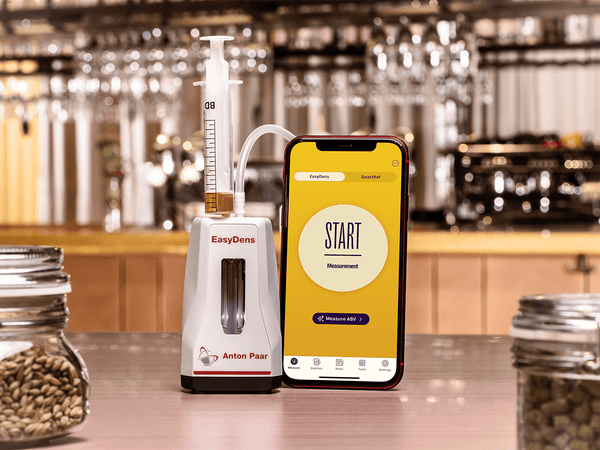
For your characteristic wine
EASYDENS WINE HYDROMETER | WINE MEISTER MOBILE APP
EasyDens makes fermentation tracking of your wine more accurate than ever. In combination with the Wine Meister mobile app for iOS und Android, you are able to measure the sweetness of grapes, follow the fermentation of wine, calculate the residual sugar, and determine the estimated alcohol content of your finished product.
Measurement results can be instantly saved into batches. This permits you to always come back and check your values for consistent high-quality results for your wine.

With a small sample volume of only 2 mL EasyDens and the Wine Meister app deliver highly precise results with Automatic Temperature Compensation (ATC):
- Brix [°Bx]
- Oechsle [°Oe]
- Klosterneuburger Mostwaage [°KMW]
- Baumé [°Bé]
- Babo [°Babo]
- Sugar concentration [g/L]
- Specific Gravity [SG 20/20]
- Est. ABV [%v/v] (based on OG & FG)
- Density [g/cm³] at current temp.
- Temperature [°C], [°F]

Save up to -10% with our Winemaker's Kit Deal
- Sugar content of grapes & must
- Fermentation tracking
- Precise alcohol content (± 0.5 %v/v)
- In-app residual sugar calculator
- Additional equipment
EasyDens Wine Hydrometer for your wine making process
The production of high-quality wine starts with the harvesting of the grapes, where the sweetness of the fruits is measured, in order to determine their ripeness. It’s not only crucial to use the best starting ingredients, but also to always keep track of your fermentation process in terms of concentrations and temperature. Therefore the right measuring equipment plays an essential role during the process.

The sugar content of your grapes is significant for the outcome of your wine. Since EasyDens only needs a sample volume of 2 mL, you can easily smash a few grapes and check the sugar content before harvesting. Usually, grapes for table wines are harvested with a sugar content of approximately 19 - 25 °Brix. The density and sugar measurements will give you an estimation right at the start on how much alcohol can be achieved in your finished wine.
After harvesting the grapes, they are crushed and pressed. While for white wines seeds, solids and skins are quickly separated from grape juice, there is no separation for red wines during fermentation to let the color develop.

Before fermentation begins, the original gravity (SG before fermentation) is measured so that the Wine Meister app can subsequently calculate the estimated alcohol content.
Fermentation begins by adding yeast to the must, which converts the grapes' sugar into alcohol and CO₂. This process can take up to ten days and more. The decreasing must weight during fermentation is tracked by EasyDens in °Babo, °Baumé, °Brix, °KMW, °Oechsle. By checking the must weight daily, the Wine Meister app displays the value changes graphically over time and allows you to check how well the fermentation is going.
Additionally, the Wine Meister app calculates the estimated alcohol content during fermentation automatically for you with the knowledge of original gravity and final gravity (SG reading during/after fermentation).
Three different ABV calculations from original gravity and final gravity are available in the app:
- Standard Formula
- C.J.J Berry Method
- The Hall equation
You can simply choose your favorite.
With the measurement of density and temperature, it is possible to see any issues during the process. This allows you to save the quality of your batch if something is going the wrong way, like a too slow or too fast decrease of the sugar content.
When the fermentation of your wine is concluded, we recommend the precise determination of the alcohol content by means of combined measurement with the EasyDens and the SmartRef Digital Refractometer. The simultaneous measurement of density and refractive index can quickly and accurately measure the alcohol content and total extract of your finished wine (Learn more…).

Residual sugar refers to the sugar left unfermented in a finished wine. It is measured in grams of sugar per liter (g/L).
The amount of residual sugar affects the sweetness of your wine, and in the EU the residual sugar content is tied to certain labeling requirements.
To determine the residual sugar, the Wine Meister app offers two formulas for calculation:
- A Simple Formula, where you select a correction factor for the measured must weight,
- and an Advanced Formula, where you specify the original must weight, the final must weight and the total acid value.
After your final measurements, the must has to be clarified, which means to leave the “pomance” in the bottom of the fermentation tank. Additionally, the wine is filtered in another vessel. After clarification, the wine can either be bottled immediately or put in tanks to let it age.
Leave the math to EasyDens and Wine Meister so you can concentrate on what you love: Making great wine!

Alcohol content of wine
Wine consists mainly of alcohol, extract (sugars, acids, etc...), and water. Due to the fact that alcohol and extract have different effects on the density, it is impossible to precisely determine the alcohol content in wine with density measurement only. However, with the help of the digital refractometer, SmartRef, this challenge can be solved.










